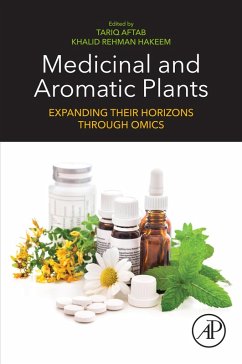Growing consumer interest in organic and herbal-based products has led to great demand in the botanicals industry in the past few years. However, the growing number of products utilizing medicinal and aromatic plants (MAPs) has threatened an estimated 9,000 medicinal plant species worldwide, making it critical to reevaluate their research and development, production, and utilization. Continuing advances in Omics methodologies and instrumentation are essential to understanding how plants cope with the dynamic nature of their growing environment, how yields and characteristics can be improved, and how to most effectively direct conservation efforts.
With a focus on metabolomics, genomics, proteomics, transcriptomics, and more, Medicinal and Aromatic Plants: Expanding Their Horizons through Omics illustrates the genetic mechanisms of MAPs, providing a better understanding of MAPs conservation and methods to improve characteristics for medical applications. With an introduction on the role of MAPs in human health, subsequent chapters discuss using proteomics to increase MAP yields and plant quality, genome editing, and CRISPR/Cas9. A valuable resource for farmers, scientists, chemists, biochemists, pharmacists, and students interested in medicinal and aromatic plants and plant biology, Medicinal and Aromatic Plants: Expanding Their Horizons through Omics ensures readers have the background knowledge to put the necessary methodologies into practice themselves.
With a focus on metabolomics, genomics, proteomics, transcriptomics, and more, Medicinal and Aromatic Plants: Expanding Their Horizons through Omics illustrates the genetic mechanisms of MAPs, providing a better understanding of MAPs conservation and methods to improve characteristics for medical applications. With an introduction on the role of MAPs in human health, subsequent chapters discuss using proteomics to increase MAP yields and plant quality, genome editing, and CRISPR/Cas9. A valuable resource for farmers, scientists, chemists, biochemists, pharmacists, and students interested in medicinal and aromatic plants and plant biology, Medicinal and Aromatic Plants: Expanding Their Horizons through Omics ensures readers have the background knowledge to put the necessary methodologies into practice themselves.
- Includes in-depth analysis of Omics technologies for the enhancement of MAPs
- Discusses applications of MAPs including their role in human health Written by world-wide leading experts in the field
Dieser Download kann aus rechtlichen Gründen nur mit Rechnungsadresse in A, B, BG, CY, CZ, D, DK, EW, E, FIN, F, GR, HR, H, IRL, I, LT, L, LR, M, NL, PL, P, R, S, SLO, SK ausgeliefert werden.

